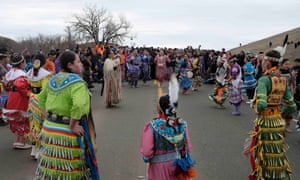Dakota Access pipeline protests: UN group investigates human rights abuses

Native American protesters have reported excessive force, unlawful arrests and mistreatment in jail where some activists have been held in cages

A United Nations group is investigating allegations of human rights abuses by North Dakota law enforcement against Native American protesters, with indigenous leaders testifying about acts of war they observed during mass arrests at an oil pipeline protest.
A representative of the UNs permanent forum on indigenous issues, an advisory group, has been collecting testimony from Dakota Access pipeline protesters who have raised concerns about excessive force, unlawful arrests and mistreatment in jail where some activists have been held in cages.
When you look at what the international standards are for the treatment of people, and you are in a place like the United States, its really astounding to hear some of this testimony, said Roberto Borrero, a representative of the International Indian Treaty Council.
Borrero, a Taino tribe member who is assisting the UN forum in its interviews, told the Guardian on Sunday night that the activists stories of human rights violations raised a number of serious questions about police response. A lot of it was just very shocking.
The pipeline protests have become increasingly intense over the last two weeks as construction has moved closer to the Missouri river and as police have aggressively responded to activists demonstrations with arrests, pepper spray, riot gear and army tanks.
The Standing Rock camps first emerged in April and have since drawn thousands of Native Americans and climate change activists from across North America and beyond to rally against the $3.7bn oil pipeline, which would carry crude oil from the Bakken oil field to a refinery near Chicago.

The tribal leaderships attempts to block construction in court have been unsuccessful, and the pipeline operator, Texas-based Energy Transfer Partners, has moved forward at a rapid pace, building on lands that indigenous leaders say contain sacred burial grounds.
Despite the 22 October arrests of more than 120 people, activists set up new camps on the sites where construction is planned, not far from the river that they fear could be contaminated by the pipeline.
The Morton County sheriffs office responded on 27 October by surrounding the protesters and arresting 141 people.
Officials have accused activists and journalists of a range of charges, including criminal trespassing, rioting, and a number of serious felonies. Law enforcement have also set up strictly enforced traffic blockades protecting the pipeline site from protesters and the general public.
Native Americans recently released from jail, including elderly women and young activists, have since shared stories with the Guardian of the treatment they faced behind bars, which they said was cruel and inhumane.
Jailed protesters said it seemed clear that police werent prepared to handle hundreds of people at once in their local correctional facilities. A day after their release, many still had numbers and charges written on their arms in marker which advocates said was an unusual and dehumanizing way for police to track inmates and some were temporarily kept in cages that they said felt like dog kennels.
On Monday, Borrero and Grand Chief Edward John, a Native American member of the UN permanent forum, met with police officials in the local town of Mandan and visited the controversial cages.
The Guardian was planning to join the UN on the visit, and a police spokesman initially told a reporter, We have nothing to hide.
But sheriff Kyle Kirchmeier, the controversial law enforcement official leading the response to the protests, later refused to let the media in, saying allegations of poor treatment were not true, before slamming a door on a reporter.
Another official with the sheriffs office also appeared to be hostile toward the UN representatives when they arrived. In the presence of a Guardian videographer, that police official told Borrero and John it seemed as if they werent neutral and had already made up their minds that police had mistreated protesters.
A spokeswoman later sent photos of the holding cells, adding in an email that the temporary fenced cubicles were at least 10 by 14ft. The images show a windowless room with a number of parallel cages with ceilings of fencing.

The spokeswoman also claimed that while in the cells, the inmates have access to bathrooms, food, water and medical attention.
But several arrested protesters said they had to wait for basic necessities.
Johanna Holy Elk Face, a 63-year-old woman arrested last week, told the Guardian that she is diabetic and had very high blood sugar while behind bars. Police were slow to respond to her request for help, she said.
I was scared, she said, adding that she was worried she was going to have a seizure.
Phyllis Young, a member of Standing Rock Sioux tribe, also provided testimony to the UN representatives on Sunday inside a small tent that shook as strong winds blew outside.
Young said she intended to help the tribe file a lawsuit against North Dakota law enforcement, saying the polices violent acts against native people were not only conditions of colonialism, but conditions of war.
We embarked upon a peaceful and prayerful campaign, she said. They were placed in cages. They had numbers written on their arms very much like concentration camps.
The UN forum, which has previously urged the US to allow the Sioux tribe to have a say in the pipeline project, plans to issue a report and possible recommendations after its inquiry is complete.
Kandi Mossett, a 37-year-old protester and member of the Mandan, Hidatsa and Arikara nation, got emotional while standing in the rain recounting the mass arrests last week.
The government is allowing the police force to be used as a military force to protect an oil company, she said.
Mossett said she would like to see the sheriff investigated and major reforms instituted in the department to stop the violent response to peaceful demonstrators.
This started out as defending water, but now its so much more.
Young said she was particularly disturbed to hear police talk of shielding pipeline property from activists, considering the long history of abuse against Native Americans in North Dakota and across the US.
When they tell us we should protect property, they need to eat their words. Who is the thief here?
No billionaire owner, no shareholders. Just independent, investigative reporting that fights for the truth, whatever the cost. Why not support it? Become a Guardian US member for $49 a year, or make a contribution.